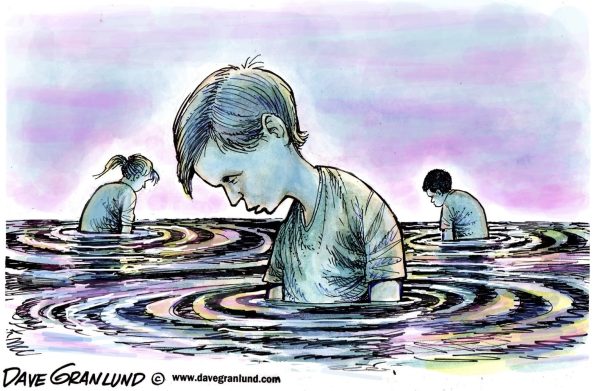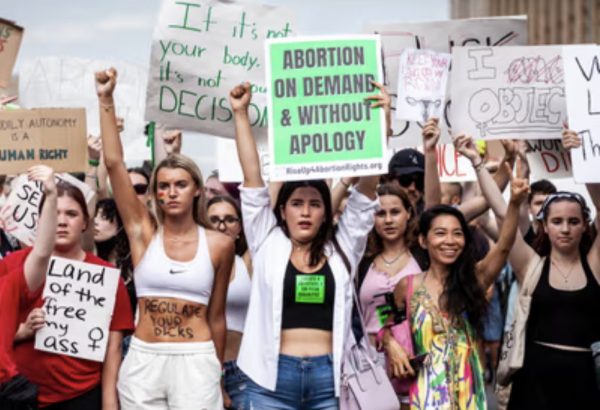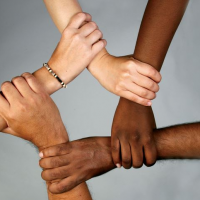Why Liberal Youth are Becoming More Depressed
Depression in teens and young adults is growing among Liberals
It’s becoming commonplace for young people who have chosen a politically liberal stance to become depressed because the outrage that is required to remain determined to remain liberal has a cost on the human psyche. It turns out that a worldview built on perpetual outrage isn’t healthy.
America is experiencing a mental health crisis. The Youth Risk Behavior Survey released by the Centers for Disease Control and Prevention (CDC) backs up this growing reality of just how serious the problem has become for young people living in the United States. At the forefront of this study, three out of every five teenaged girls felt persistent sadness in 2021. Admittedly, Covid-19 may have had some impact on this, but girls are twice as likely to be depressed as boys. Alarmingly, one in three girls surveyed said they seriously considered suicide.

There are several relevant factors. Social media has had a negative impact long ago before the mental fallout from Covid-19 that made the problem worse. Most surprising to some observers is the data found in the CDC’s conclusion of depression in youth. A teenager’s political views impacted his or her levels of depression.
Released in December of 2022, the study found that teens who leaned more towards liberal ideologies are more likely to be depressed than their conservative peers.
The research showed that liberal boys are more likely to be depressed than even conservative girls. While not conclusive, this study suggests political beliefs are more impactful than being male or female when it comes to depression.

The study attempted to explain the depression of liberal teenagers. Of the two observations, the first stated liberal teens are depressed because they live in a world dominated by conservative values. The report also stated that more liberal teenagers “may have therefore experienced alienation with a growing conservative political climate such that their mental health suffered in comparison to that of their conservative peers whose hegemonic views were flourishing.”
In contrast to this study, it would be a long shot to assume that even a few conservatives agree with the suggestion that conservative political attitudes have achieved dominance in our present political culture.
Alternatively, the authors of the study suggest that progressive kids might be more depressed because they are being targeted—directly or indirectly—by conservatives. The study claimed that “heightened awareness and experience of conservative actions to restrict their rights may have compounded emotional distress.” Is the world just kinder to conservative teenagers?
This doesn’t seem to match reality.
It’s telling that liberal writer Matthew Yglesias isn’t buying it. He wrote, “The catalog of woes offered in the paper sounds less to me like a causal explanation of why progressive teens have more depressive affect than it does like listening to a depressed liberal give an account of recent American politics.” It would seem that liberal adults can’t explain the depression of liberal young people because they are afflicted by the same depressive malady. This said, we should at least consider the possibility that the modern liberal worldview is just depressing.
Partisan differences in America used to be different. In the recent past, they were defined by prudential disagreements over the size of government, foreign policy, marginal tax rates, the scope of appropriate regulation, or the most effective way to help the poor. Today, our political differences are defined by disagreements over the question of whether biology or feelings determine someone’s gender. These are not prudential differences, they’re existential.
The instinctive reactions to the continuing crisis of school shootings illustrate this point. Half the country is quick to assert “only God can fix this” while the other half is quick to say, “only government can fix this.” Of course, not all conservatives are religious nor are all liberals secular, but that is the undeniable trend.

At the heart of modern liberalism is the belief that we belong to ourselves. The “my body, my choice” worldview offers a sense of control but provides no solutions when things are out of control, and liberals are convinced of nothing if not the fact that things are going poorly: The American dream is a sham, climate change will kill us all, and systemic racism is eternal.
Not only does modern liberalism require awareness of the problems, both real and imagined, it demands a fixation on them.

The Prayer of Serenity has been replaced by “If you’re not angry, you’re not paying attention.” It’s not enough simply to treat people well. “If you’re not anti-racist, you’re racist.” Doing your part to make the world better is insufficient because, “injustice anywhere is injustice everywhere.” Foote note: These quotes originated through the Marxist group, Black Lives Matter. To live with this level of animosity and declaration is exhausting and May quite possibly be why so many are depressed.
The Angst within Liberalism
Yglesias notes that the left’s perpetual outrage has turned anger and depression into a form of virtue. He argues that progressive adults “valorize depressive affect as a sign of political commitment.” The good liberal knows only the ignorant and apathetic have time to be happy. Since they feel the world’s problems will never end, their moment for contentment, rest, and gratitude will never be within their reach.
Enter the Christian World View
Christians have a way to cope with a broken world. This mindset about the broken world we live in is rooted in the hope that comes from knowing Jesus personally as Savior. While Jesus promised us that we would have trouble, He also encouraged us to take heart because He has overcome the world. (John 16:33). When a person is born again and filled with God’s Holy Spirit, our worldview is one of joy and hope despite the circumstances we face, we are changed in supernatural ways.
It is in this change that our hope transcends the circumstances of our lives and allows us to experience joy and peace even in the midst of suffering. Today’s secular liberals have no such hope. In their minds, joy will come once they’ve worked hard enough to fix all the problems of the world . In my humble opinion, this alone is definitely a probable cause for depression if a person is a liberal. Hopelessness mixed with ongoing unresolved anger is not healthy by any standard of mental health.


